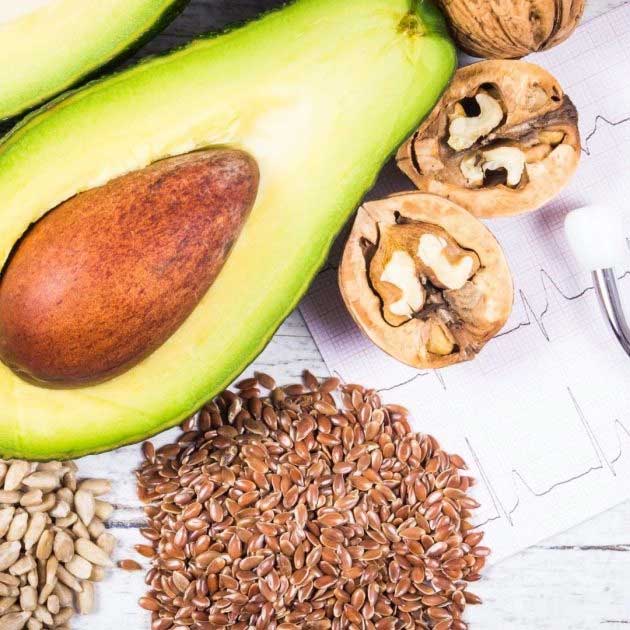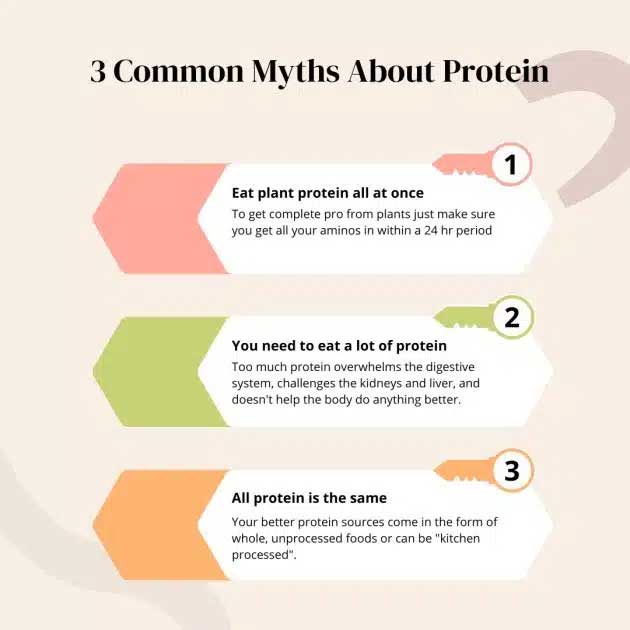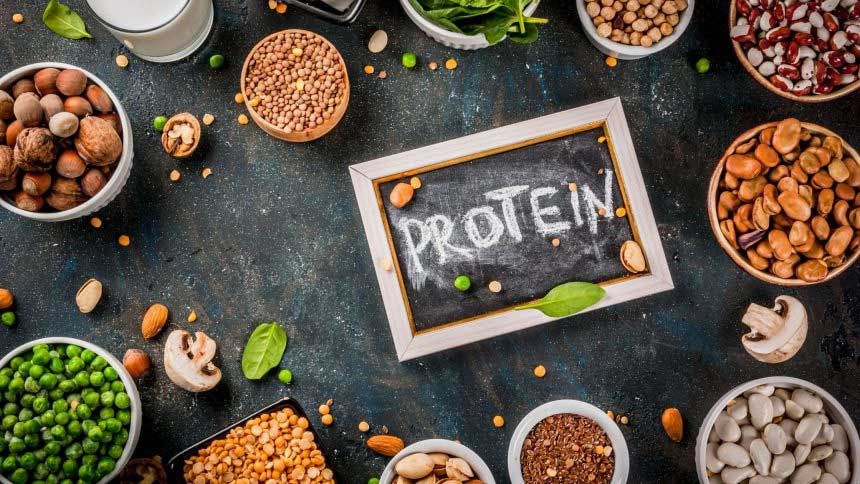INTRODUCTION: MYTHS ABOUT PROTEIN
There are more myths about protein floating around than there are stars in the sky!
We’ve always known that protein helps us get those big muscles, but more recently, we are aware of protein’s role in helping to support a healthy metabolism, energy levels, and communication between the cells in your body.
Proteins are made from a variety of amino acids. The body makes many of the things it needs from its “cupboards” of ingredients. However, there are certain aminos – the essential ones that the body does not make so you need to get them from food and, as needed, supplements.
Amino acids are found in both animal proteins and certain plant proteins. They are given the name “complete proteins” when they contain some amount of all of the essential amino acids.
This does not make them “better”. Keep in mind that the body works effectively to combine the amino acids into proteins so there are rare circumstances demanding the need for consuming a “complete” protein versus a diet rich in the different amino acids.
TIPS TO GET ESSENTIAL AMINOS FROM PLANTS
It’s actually pretty easy to get your essential amino acids from plants. Give these quick and easy recipes a try!
Histidine: Edamame – Dip it: 1/4 c. organic edamame hummus + unlimited non-starchy vegetables (cucumber, zucchini, green peppers, cauliflower).
Isoleucine: Quinoa – 1/2 c. cooked quinoa + 1/4 c. organic blueberries + 1/4 c. chopped pecans + 1 tsp cinnamon + vanilla stevia.
Leucine: Hemp seeds – 1/2 c. brown rice, cooked, 1 Tbsp olive oil, and 2-3 Tbsp hemp hearts.
Lysine: Cremini mushrooms – 1/2 whole wheat tortilla brushed with 1/8 c. organic marinara sauce with 1/2 c. cremini mushrooms sautéed with garlic, onions, red peppers; optional cheese, dairy-free cheese, or organic chicken or bison meatballs. Bake in the oven at 350 for 7-9 minutes.
Methionine: Pine nuts – Sautee 2 c. spinach and 1 garlic clove in 1 Tbsp olive oil. Stir in 2 Tbsp pine nuts. Mix in 1/2 c. cooked lentil pasta.
Phenylalanine: Organic tofu or tempeh – 2/3 c. organic tofu taco crumbles with sautéed organic veggies + lettuce cups; optional: sprinkled with 1/4 c. peanuts or drizzled with 2 Tbsp melted peanut butter.
Threonine: Kidney beans – Unlimited greens + 1/2 c. kidney beans + tomatoes, onions, green peppers + 1/4 c avocado + 2 Tbsp salsa as the “dressing”.
Valine: Almonds – Trail mix: 2 c. air-popped organic popcorn lightly oiled with coconut oil + 2 Tbsp chopped almonds + 1 Tbsp organic cacao nibs + 1 Tbsp unsweetened shredded coconut.
Tryptophan: Organic kale – 1 serving organic kale chips + . c. pistachios.

PROBLEMS WITH PROTEIN
Proteins can also cause problems. They may contribute to or be the cause of allergies, intolerances, inflammation, and irritation. Proteins are typically the culprit or at least collaborators in all of these health issues.
For example, they are most commonly the triggers for an allergic or intolerant reaction, or their form (i.e. what’s been done to them) can overwhelm the digestive system or cause confusion and irritation for the immune system.
The quality and quantity of protein consumed most often play a key role in your health whether you’re healthy and seeking to stay that way or trying to address a health issue.

3 COMMON MYTHS ABOUT PROTEIN
This brings me to 3 of the most common myths about protein.
Myth #1: To get complete plant protein we have to eat it all at once: We used to think that vegetarians have to eat rice and beans together so that their aminos would be assembled into a complete protein.
We now know that can occur over twenty-four hours or longer, which is helpful, especially for vegetarians, vegans, and anyone eating plant-based so that they don’t overdo it on carbs in the name of getting “a complete protein.” Additionally, there are several plants that deliver complete proteins like hemp seeds, quinoa, and organic soy (tofu, tempeh, milk, and edamame).
Myth #2: Eating too much protein. Yes, the body needs protein daily but it can also get too much. Too much protein overwhelms the digestive system, challenges the kidneys and liver, and doesn’t help the body do anything better.
So how do you know if you are getting enough or too much? Your protein range is specific to who you are today and takes into account your age, weight, life stage, and health goals.
Myth #3: All protein is the same. All protein sources are NOT created equal. Your better protein sources come in the form of whole, unprocessed foods (think quinoa, beans, cashews, hemp seed) or be ‘kitchen’ processed (think hemp protein concentrate, almond butter, chickpea flour.
Remember, it’s about better, not perfect, choices because there is no perfect protein – no matter what any magazine, tweet, insta, or TV show guest says!
CONCLUSION
Protein is something we all need whether we’re vegan, vegetarian, pescatarian, keto, paleo, or whatever way of eating you choose! However, it doesn’t have to be hard to meet your protein needs — even if you follow a plant-based diet.
If you feel you need more personalized help, ask me for a protein evaluation so we can assess your needs and help you learn to space your protein throughout the day for better energy, better digestion, and better recovery.


